You are here: Home | Uncategorized | Taking from the poor: A mirror into South Sudan’s gold-mining business
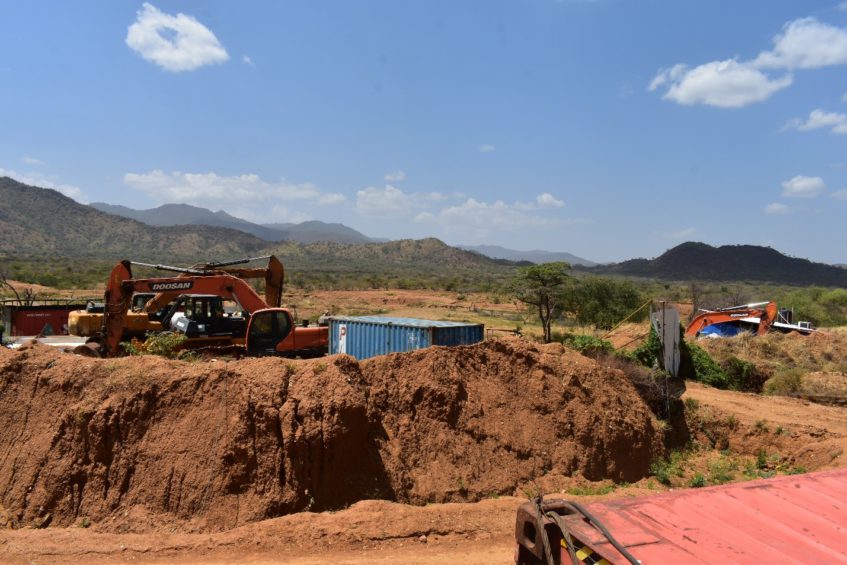
A gold-mining site in Faka, Ngauro area, Eastern Equatoria State | Credit | Jale Richard/Eye Radio
For over a year, the 28-year-old made his living as a machine operator at a gold mining company in the bushes of Kapoeta South County, Eastern Equatoria State of South Sudan.
But when the South Sudanese government suspended the operation license of gold-mining companies in late 2019 to stop illegal operations, business at the Chinese-owned company got paralyzed, rendering the over 20 laborers, and machines idle.
Mr. Tumuhimbise had been operating the excavator as they dug the ground looking for pieces of gold that are widely used to make the world’s most prized objects: wedding rings, Olympic medals, money, jewelry, crucifixes, art, and many more.
The mining company they work for—Shino Minerals is a well-established Chinese company with a track record in the western Ugandan district of Bushenyi where Tumuhimbise and his Ugandan colleague Nehemiah Kabeho were brought from.
But it is not business as usual after the government ordered all mineral companies to suspend operations and reapply for renewal.
Now, Tumuhimbise, his colleague Kabeho, and their unnamed Chinese boss hope the government will renew their operation license to continue mining for gold along the Singaita river in Kapoeta.
“We were about 20 workers but the rest have gone home because they are the locals of the area,” Tumuhimbise says.
“For us, since we were brought from Uganda, we are stuck here with our (Chinese) boss. If our license is renewed, we shall restart working because now life is hard in this bush.”
Despite being known primarily as an oil producer, South Sudan has substantial gold deposits. Most gold mining takes place in Central Equatoria and the Eastern Equatoria States where the country’s best deposits are found. Although, small mining activities have also been reported in other areas across the country.
Gold as a livelihood
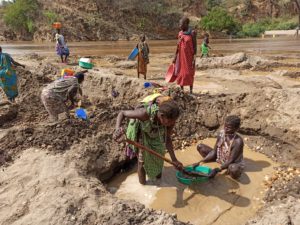
The gold mining industry, though not fully controlled by the government, employs tens of thousands of artisanal miners.
Majority of artisanal miners are unregistered and operate illegally, even though the law requires individuals to register with the Ministry of Mining so they can be assigned specific areas to operate. This makes monitoring of their activities and enforcement of mining regulations very difficult.
Locals use crude traditional means and equipment to dig the gravels and carry out the soil to the surface. They pan the soil and gravel in water to recover small gold particles.
Abraham Lobei was introduced to gold mining by his father when he was just a teenager.
For years, the 32-year-old has mastered the art of gold mining, traversing the Kapoeta areas looking for the precious metal. Out of this, he has married two wives.
“This place is good because even if you have no relatives to help you, you can come here to get money to feed yourself,” Mr. Lobei says, his dark skin covered with mud having just climbed out of the nearly 20-meter hole at the Nakeke site in Kapoeta South County.
Lobie is one of the thousands of locals and foreigners who have found employment in the lucrative gold mining business.
The work provides miners resources to support their families with basic needs such as food especially in the poverty-stricken pastoralist community of Kapoeta.
Gold has helped Achii Lorot provide for her family of nine children food and medicines for the last 15 years.
“I mine gold from Nakeke site and bring it here (Kapoeta town) and sell and then use the money to buy food,” she says after exchanging her gold for food items at a local shop run by Somali businessmen.
Living in the impoverished Kapoeta region, the 52-year-old mother says together with her husband, they turned to gold mining to survive starvation.
“We have just come to look for food. Since last year, my crop harvest was little, what helped me and other people was the relief food. We are also asking the gov’t to help us get some relief food this year,” she says.
But their immediate savior—gold, is not easy to find. The elderly woman, looking weary, says it takes up to ten days of hard labor to get a gram which earned about 3,000 SSP (50 USD) at the beginning of 2021.
“Now this year (2021), we are struggling to even find enough gold,” Lorot says.
Like other artisanal miners in Kapoeta, Lorot sells her gold to local shop owners and gold dealers. A gram was sold at 50 US dollars in February 2021.
Risky adventure…
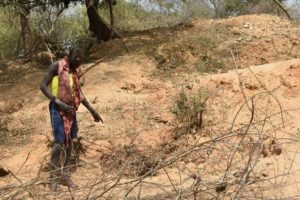
At the various gold mining sites across the country, not all is gold. Some artisanal miners meet their death while digging for the precious metal.
About 30-minutes’ drive from Kapoeta town, lies Nakeke, where hundreds of children, women, and men are busy looking for gold particles. The men dig the holes to unearth the soil for the women to pan in the waters of river Singaita.
The place is buzzing with music played on small phones, also used for lighting the deep holes—sometimes as deep as 30 meters.
There is noise coming from all corners: children, women in their groups, and men-some drunk call this place their fortune maker.
But there is a strong odor of something rotting away…
Abraham Lobie, a local miner points to a spot sealed off by thorns. Here, at the end of January, six holes where local miners were digging for their fortunes collapsed, burying about 30 people.
But the miners proceed with their work unbothered by the nauseating smell of human bodies rotting away as if none of them had died.
Mr. Lobie says the information of people being buried inside the mining holes is no longer news.
“You know this place is where people eat, and you cannot leave a place where there is food,” Lobie says of people continuing to risk their lives in the deep-hollow holes.
“The people buried have already died. Maybe that was their fate made by God.”
The locals operate in dangerous conditions with no safety regulations, poor equipment, and a culture of risk-taking.
In Faka, another mining site of the Ngauro area, three people died in a gold accident in early February 2021. Three others survived the accident after they were pulled out of the more than 10-meter deep hole.
“We are used to taking risks,” says 21-year-old Lino Lokoro. “You know, without risks, you won’t feed your family and get money for marriage.”
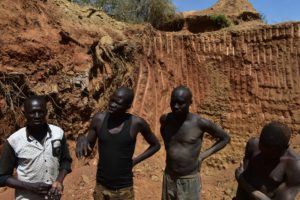
Illegal activity
The various mining sites in the area are largely unregulated as hundreds of young, women and men flock to the sites where deposits are believed to be in abundance.
The practice is largely illegal according to the 2012 Mining Act.
The law stipulates that all mining without a license becomes illegal, including artisanal mining.
However, locals who have dug for gold for ages are not aware, of the government’s mandate to control the activity.
There is also a military presence at mining sites.
In Central Equatoria State, gold mining in some areas has been militarized, with reports of government and opposition forces clashing over control of areas.
In Paya, a small mining site in Karpeto Payam of Lobonok County, all of the working population can be found in the informal sector. People are continuously risking their lives digging underground and use basins for washing the gravels in search of gold, hoping to make enough money to take them out of poverty.
Set between the mountainous areas of Lobonok located a strenuous three-hour drive from the South Sudanese capital, Juba, gold has been dug from the surrounding areas for more than a century, with activity rising along with the gold price.
But civilians displaced by recent fighting in the mountainous mining areas of Lobonok have difficulty accessing the area, despite the return of relative calm.
“I have mined here for at least five years now but currently things have changed, the soldiers as you can see, have sealed off the route leading to the mining area,” an artisanal miner, Susan Poni says.
“You can’t risk going there anymore,” she adds, revealing that government soldiers have taken over the area, allowing no one to access it.
The only way to access the mining sites is when soldiers forcefully take the villagers to go mine for them.
“The soldiers sometimes arrest people to go and mine for them for weeks and they would be released. If you are lucky, you will be left to go alive but if you are unlucky that is the end of your life,” the 34-year-old Poni reveals.
Having lived on gold earnings for years, civilians there are now deprived of their livelihood.
According to a local chief Loku Solomon, civilians who had moved to the mining area in Paya used to support their families out of their hard labor—but have been forced to return home, destitute.
He says the soldiers intimidate locals and sometimes rape women who try to sneak into the mining site.
“If the government wants to control mining here, nobody can refuse but why have they brought in the soldiers instead of the police?” chief Loku wonders.
He says before the army was deployed, locals accessed the area freely. But now, despite trying to plead with the army to allow artisanal miners to continue with their livelihood activity, the army disregards his letters permitting access to the mining sites in Paya.
According to South Sudan’s Ministry of Mining, there is no formal gold mining yet in South Sudan.
The Undersecretary in the mining ministry, Dr. Andu Ezbon Adde, said the foreign companies involved in the sector have only been issued exploration licenses.
“Actually, there is no formal gold mining taking place in South Sudan at the moment. What is taking place is artisanal work, that is mining done by the natives using crude traditional means and equipment,” Ezbon says.
But across mining sites in Kapoeta, there are abandoned excavators and gold panning machines, signaling a once vibrant industrial-like gold mining.
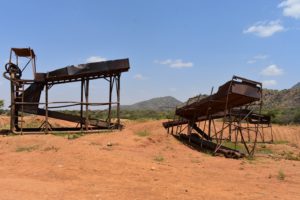
Government can’t control the secretive business
Across mining sites in the country, there is no presence of relevant government institutions in the mining and exploration areas; consequently, no monitoring, no substantial sensitization and consultation, no conflict prevention, and no support are possible.
Mining communities say they feel completely neglected and think that the government is interested only in company operations.
In Kapoeta, they accuse foreign companies of exploiting and destroying their environment.
The Eastern Equatoria State Investment Authority was created in 2015 to regulate investment in the state, including in mining. It was later tasked with buying gold from the locals in the state.
But the Investment Authority has not performed to its expectations as gold transactions are conducted underground, with little knowledge of regulatory government institutions.
In January 2021, the Governor of Eastern Equatoria State, Louis Lobong Lojore appointed a new official to head the state Investment Authority, and regulate the gold business.
But both the national and state government have failed to control the secretive gold business.
In 2020, the Bank of South Sudan announced plans to purchase crude gold locally in a bid to boost the country’s economy. The particular area of focus was Kapoeta where thousands of artisanal miners are engaged in the gold business.
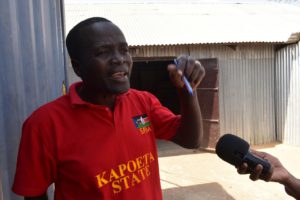
But the plan failed as local miners in Kapoeta prefer selling their gold to Somali nationals who set up the price above the government price.
Governor Lobong’s government admitted that the state government has failed to control and regulate the gold mining business.
“We have failed to control this (gold) business, we have failed completely,” says Titus Lokwachuma Lotyam, the State Investment Commissioner agrees.
“When we try to set the price, the local people say we are cheating them, then they take the gold to the Somalis where the price is much higher.”
Mr. Lokwachuma, says in February 2021, a gram of gold sold at 33,000 South Sudanese Pounds, about 50 USD, much higher than in the international market.
This is because, in the poverty-stricken Kapoeta areas, locals use gold to buy commodities including food items, mostly sold by Somalis.
“The Somalis are buying it (gold) in order for them to get hard currency. It has become the mode of getting foreign currency because when they go to sell it either in Uganda or Kenya, they buy food items and bring them to sell here. And then they make profits from the food items that is why it is difficult for us to regulate,” Mr. Lokwachuma explains.
Gold supply chains and actors
In addition to artisanal mining, there are industrial-like mining operations concentrated in the Gorom and the Kapoeta areas where Tumuhimbise works.
This claim has been corroborated by a report in May 2021 by Global Initiative Against Transnational Organized Crime.
In South Sudan, local buyers buy gold from miners and sell it to larger buyers in regional towns, such as Kapoeta. From there, dealers take the gold to Juba either by air or by car, or over the border to Uganda or Kenya.
Most of the gold produced in South Sudan is smuggled out of the country.
The main supply chains run from South Sudan across Uganda and Kenya and it also moves to the DRC and Sudan. Many consignments are also flown out of Juba.
The direction in which gold moves is largely determined by the proximity of the closest border. The main border posts used for this purpose are Nimule-Elegu and Kaya (Uganda) and Nakodok (Kenya). For gold moving by air, it moves from Juba primarily to Kampala, Dubai, and China.
Kapoeta
Artisanally mined gold is mostly sold to Somali traders, but also Kenyan and South Sudanese businessmen.
A local dealer who worked for a gold mining company says gold from Kapoeta, gold is smuggled into Kenya through the Nadapal-Lokichogio border post.
“Some traders will sell gold at the Lokichogio border with Kenya, while others will transport the gold all the way to Nairobi,” says the 20-year-old man who preferred not to be named for security reasons.
Juba the capital, various groups of actors are active in the illicit gold market. Chinese nationals, political and business elites, and Ugandans and Kenyans are all active in the Juba gold trade.
Lobonok
Local buyers are from the community and they sell to businessmen from Juba and Nimule who frequent the main town.
“These buyers coordinate gold purchases with local buyers by telephone, negotiating prices and a pick-up schedule. From Lobonok gold moves south along the Juba-Nimule highway, through the Nimule-Elegu border post, and on to Kampala,” local chief Loku reveals.
Who is involved?
Details about how the gold trade in South Sudan works, and who profits, are scarce.
In the past two years, watchdog groups have published reports that implicate the country’s top leaders of being illicitly dealing in the gold business.
For example, the governor of Eastern Equatoria State, Louis Lobong Lojore and some members of South Sudan’s first family were named in a century report last year, although they all deny wrong doing.
Also in 2019, a number of lawmakers from Eastern Equatoria State wrote a petition to President Salva Kiir, asking him to investigate Governor Louis Lobong, accusing him of aiding smuggling of gold worth millions of dollars out of Kapoeta.
But the Eastern Equatoria Governor denies any wrong doing.
“We would like to state to the world, the people of South Sudan, Eastern Equatoria and the family and friends of the Lojore family that the Lojore family has never committed any wrongdoing and as such, we are ready to pursue this case against Sentry before the court of public opinion and the court of justice to clear our family name,” Lobong added.
However, up to now the Eastern Equatoria Governor has not initiated a legal proceeding against the US based Sentry that published “The Criminalization of South Sudan’s Gold Sector” report last year.
How much does the government gain?
It is difficult to estimate the amount of gold produced. Neither the Ministry of Mining nor the Ministry of Trade has data on the country’s gold production or trade.
But according to export data from the Observatory of Economic Complexity (OEC), in 2019, South Sudan exported $47.6M in Gold, making it the 112th largest exporter of Gold in the world. In the same year, Gold was the 2nd most exported product in South Sudan.
The main destination of Gold exports from South Sudan is United Arab Emirates ($47.6M).
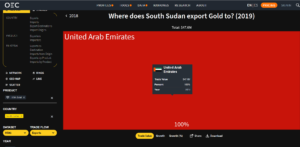
Environmental concerns…
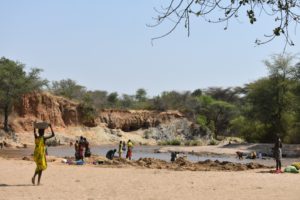
According to South Sudan’s Mining Titles Regulation 2015, titleholders are required to monitor the impact of mining operations on the environment.
The companies are also expected to engage in community development works as part of their corporate social responsibility to the community they are operating in.
However, in Kapoeta, locals say mining companies have extracted their gold and left without providing much to help the community get out of their vicious cycle of poverty.
The greater fraction of mining areas has been rendered bare due to mining activities. Large tracts of land in Ngauro and Nakeke, among other places, have lost their vegetation cover as a result of gold mining.
The resultant repercussions are massive gullies, excessive run-off, heavy erosion, reduced soil infiltration, reduction in groundwater recharge, and consequent loss of land productivity.
According to observations during field trips in Kapoeta, vegetation, biodiversity, been destroyed and water bodies contaminated.
Locals blame small-scale gold mining companies for the removal of vast quantities of surface vegetation and mass deforestation in mining sites across Kapoeta. In addition, miners typically abandon pits and trenches without properly reclaiming spoils.
In Faka, land expanding to about 1kilometer square is left open by a mining company the locals only know as “Chinese.” The company has since ceased operations.
When it rains, the pool fills with water and cuts off communities of Faka and hose in Ngauro town.
A number of people have drowned while trying to cross from the vast excavated land left open.
“They used excavators to dig and when they left the place, it has formed a lake here,” and we cannot cross from Ngauro town to Faka when it rains because it is filled with water,” says artisanal miner Lino Lokoro.
Environmentalists say they have documented at least ten deaths related to environmental damages caused by gold mining in the greater Kapoeta areas.
For Lokoro mining companies will have to first build roads, open schools, and hospitals before they will be accepted to operate in Ngauro.
“When they came, they promised a lot of things but see when they stopped, we are still the same,” Lokoro adds. “There are no schools, and hospitals built by the Chinese companies.”
Editor’s Note: This story was produced with support from Journalismfund.eu’s Money Trail Project.
Support Eye Radio, the first independent radio broadcaster of news, information & entertainment in South Sudan.
Make a monthly or a one off contribution.
Copyright 2024. All rights reserved. Eye Radio is a product of Eye Media Limited.